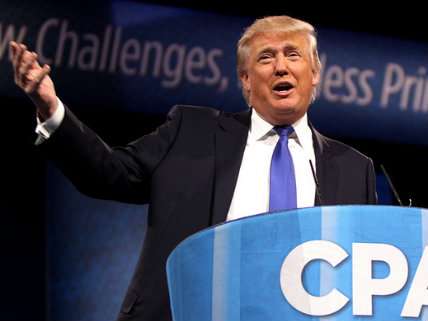Trump Doesn't Understand the GOP Health Care Bill. That's a Barrier to Good Policy.
The president can't negotiate a better bill if he doesn't understand the current one.

Over the last two days, President Donald Trump provided more evidence that he doesn't entirely understand the health care bill his administration is urging Republicans to pass. In a one-on-one interview, John Dickerson of CBS News took the sadly unusual tack of asking Trump to explain what was in the American Health Care Act (AHCA). Trump couldn't do it. That's a real problem for those who want to see better policy put in place.
"We've made many changes to the bill," Trump told Dickerson, "We now have preexisting conditions in the bill." Trump made the same claim again when speaking to Bloomberg News on Monday. "I want it to be good for sick people," he told Bloomberg. "It is not in its final form right now. It will be every bit as good on pre-existing conditions as Obamacare."
But the recent changes to the bill would have allowed states to obtain a federal waiver to opt-out of community rating, the key regulation governing what are commonly described as Obamacare's preexisting conditions rules. In order to obtain that waiver, states would have to set up a high-risk pool—a government funded insurance plan for individuals with expensive medical conditions—but the Manhattan Institute's Chris Pope notes, those risk pools have historically been underfunded and expensive for enrollees. In addition, as the Cato Institute's Michael Cannon notes, the waivers are structured in a way that would likely accelerate the meltdown of the individual insurance market in states that applied for them. The bill has been changed, yes, but not in ways that add or reinforce Obamacare-style preexisting conditions protections, as Trump claimed.
Trump also told Dickerson that, "We're taking across all of the borders or the lines so that insurance companies can compete," presumably a garbled reference to allowing health insurance to be sold across state lines. On the campaign trail, Trump often repeated the mantra that he wanted to get rid of "lines around the states," though it wasn't clear he fully understood what this meant.
But there's no provision allowing for the sale of insurance across state lines. When Dickerson pointed this out, Trump said that it would be in the "second phase"—which has, in the most charitable interpretation, been described as a series of regulatory changes made by the administration after the primary bill is signed into law.
It is a problem that Trump doesn't understand the bill his administration wants so desperately to pass. It means that Trump can't describe the bill with clarity or accuracy, and that as a result it's impossible to believe what he does say. It also means that Trump doesn't really know what makes the bill good or bad, and how to negotiate towards something better. And it makes the already-difficult politics of health care reform even tougher, since Trump can't effectively haggle over the individual sticking points in a bill he can't describe.
Trump's ignorance was a factor in the failure of the bill back in March. At the time, according to Politico, Trump urged Republicans wary of voting for the bill to "forget about the little shit," and to "focus on the big picture." Those Republicans found it difficult to deal with someone who could not focus on the details that concerned them. In health policy, the big picture is a bunch of little shit.
Trump's continued ignorance about the policy details should worry House Republicans, who are being pressured by the president and his team to support deeply unpopular legislation that the president doesn't himself understand. (That problem will be compounded and repeated if the bill eventually manages to clear the House, because the Senate is all but certain to significantly alter the legislation, and because those alterations are likely to shatter whatever fragile consensus may exist in the House.)
In a way, Trump's inability to understand the bill means that he cannot really be said to support it, or at least that his support is far from stable. Privately, Trump has questioned whether or not the bill is worthwhile. During the initial push to pass the bill, Trump sometimes expressed his anxiety about the bill's merits, according to The Washington Post. He did not possess sufficient understanding of its particular to judge its quality for himself, so he repeatedly asked his aides, "Is this really a good bill?" If you have to ask, the answer is probably no.
